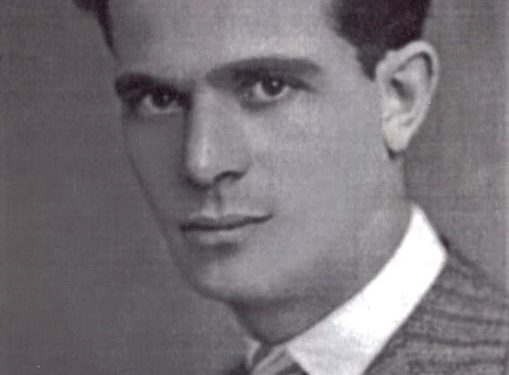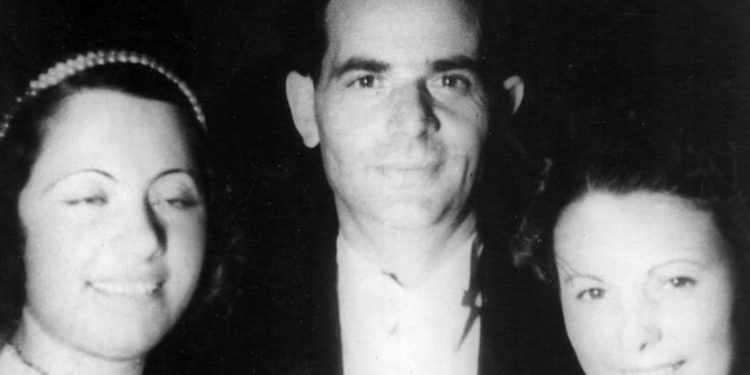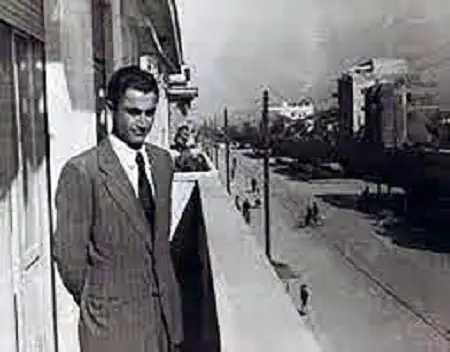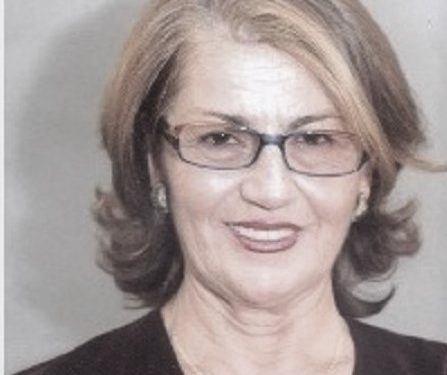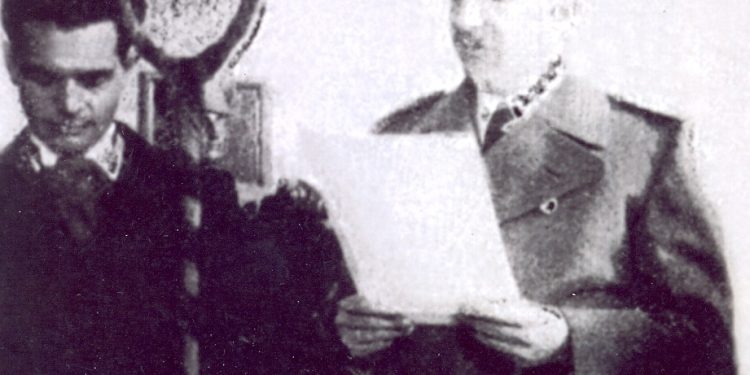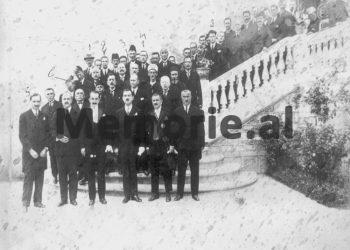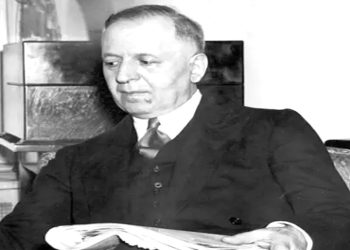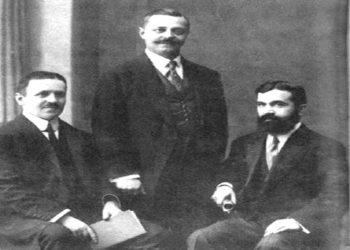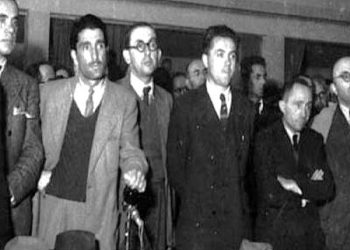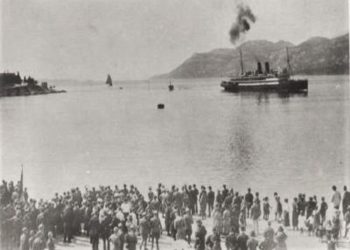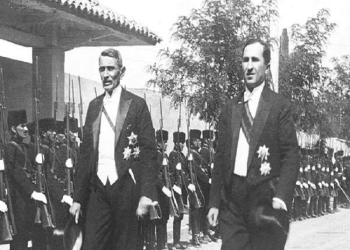By Vilhelme Vrana Haxhiraj
Memorie.al / Blood and horror. And what else could be the end of the Second World War?! But so was the period that followed. Already in the middle of 1944, it became clear that the partisan forces were gaining ground and very soon the communists would establish their government in the country. The liberation of Albania had not yet dawned well, the new winners had begun to rule towards power. The form of government was determined in May 1944, at the Përmet Congress, while the government was formed in Berat, one month before the liberation of the capital, on November 17. In order to pave their way better, in the liberated areas, by order of the General Staff of the National Liberation Army, certain partisan units started the purges against the nationalist elements. Throughout the country, many nationalists, innocent people, were executed without trial, while many others were arrested and isolated.
Arrest, trial and prison
The “black list” was drawn up a long time ago based on the opinions and information that various communist leaders, in the center or at the base, had been able to receive. A few days before Tirana was liberated, on November 13, 1944, two people knocked in the evening at Gjergj Buban’s house, on “Fortuzi” street, and asked him to go with them. This is Buban’s arrest or, more precisely, his kidnapping. Kidnapping? Undoubtedly yes. For Gjergj Bubani, as well as for many other intellectuals who were tried and sentenced in the “Trial of War Criminals” in April 1945, there is no arrest warrant.
Here begins the long path of the Albanian tragedy, which lasted not a little, but 45 years. Perhaps, from that moment, Gjergj Bubani foresaw the fate that awaited him and, powerless to change it, remained deeply silent. For a man who once, while waiting sitting at the table to celebrate his birthday with his family, suddenly learned about the fatal accident that his daughter had suffered, the disappointment of freedom was just the flow of fate without a way out, to which he must submit.
In those moments, a person no longer thinks about himself, but about those he leaves behind; his suffering increases not so much when he is in the interrogator’s room or in the damp dungeon, but when he thinks about how his wife and children will continue to cope with life. What happens to them as soon as the light of dawn rises, until they lie down in bed at night? They are precisely those who give him strength to face the difficult situation, and those who, by adding to his worry from longing, can break his soul even more, exhausted by thoughts and pressures. Like everywhere else, even in Albania, the post-war period appeared with the same symptoms: anxiety, chaos, screams, irritations. The time of the proletarians had arrived. Through the streets and squares, the triumph over the “overturned class” was also expressed in the partisan songs and verses of the “Communist International”.
The year 1945 dawned gray, rainy, sad. The most popular newspaper in the country, “Bashkimi, central organ of the National-Liberation Front”, in the first issues of the new year, started with articles and editorials, in which the victory over “fascism and the traitors of the country” was evoked, and that “the people were already masters of their own destinies”. In these unmasking pamphlets, drafted by Dr. Omer Nishani, Ymer Dishnica, Lame Kodra (Sejfulla Malëshova), etc., were constantly called for revenge and the shootings of “collaborators” were announced. The mass had to be emotionally charged, waiting in revolt for what was going to happen very soon.
On January 27, 1945, the newspaper “Bashkimi” opened with the editorial “Tradhtars”. Filled with harsh language, where pathos mingled strongly with hatred, it demanded that “traitors who collaborated with the enemy” now appear before the court and answer for their criminal activity. This article was not simply a request, but also an accusation where even the decision was given: “But the time of responsibilities has reached and with it the time of accounts.
In front of our people, all the stench of the times should be revealed, which had become a terrible boil, and the scalpel should be used to save the healthy body and replace the living part that deserves to live”. On the same day, by decision of the Council of Ministers, a ‘Special Court’ was established for the trial of war criminals. The next day, the whole country would learn of this event in the newspapers, through a brief announcement:
“A special court was created to try war criminals, the Ministry Council at its meeting yesterday decided to create a special court to try war criminals.
The following were appointed:
Prosecutor of the trial: Major General, Bedri Spahiu
Chairman: Lieutenant General, Koçi Xoxe
Member: Colonel Hysni Kapo
– N/Colonel, Beqir Balluku
– Captain of Kl. II, Hajdar Araniti
– Partisan Gaqo Boboshtica
– Dr. Medar Shtylla, Minister of Economy
– Fadil Shehu, Member of the Council Ant. N. Ç.
– Halim Budo, judge, general secretary of the Ministry of Justice
– Gaqo Floqi, judge
As can be seen, with the exception of two persons, who are at the bottom of this list, all the others were political persons. That same day, on January 27, the newspaper “Bashkimi” would open with the headline: “Balli Kombëtar, organization of treason, crime and terror”, written by Dr. Ymer Dishnica. Three days later, the same headline: “Legality, organization of treason, crime and terror”. The language used in these writings is self-evidently harsh, heavy, so much so that the leaden letters almost did not bleed. And this was written exactly from one of those who had tried to achieve peace between Albanians at the Mukje Conference! The next day, in the same newspaper (the largest at that time), Dr. Omer Nishani published the headline: “A comparison – They We”.
It is these two personalities who, alternating with each other, continue to publish articles with a blood and death-inducing character. The climax of this, the propaganda reaches on Saturday, February 6, when the entire front page, but also the greater part of the newspaper, was filled with the speech of General-Lieutenant Koçi Xoxe, in the “great rally of the capital”, as well as with the demonstrations that took place in the cities of Albania, in commemoration of February 4, 1944, the killing of 84 citizens of Tirana, by German forces.
Under the big headline: “The whole people remembers February 4 with big demonstrations in all the cities of Albania” and the sub-headline: “The people insistently demand the punishment of war criminals – they demand from the Allies the handover of escaped criminals to Italy”, the lines blackened by the bullet, they continue to convey the pain, the heroics of the war, the curse and the hatred. Before this propaganda, even the clearest mind would be clouded and every calm soul would be inflamed with hatred. A climate of tension, anxiety and impatience. Now everyone was waiting to see who the war criminals were, who had been talked about up and down, who were in the hands of justice, and what were the crimes they had committed. That’s how March 1, 1945 arrived.
The newspaper “Bashkimi” opened with the editorial: “Time of calculations”.
“Today the People’s Court opens its doors. The war criminals, the perpetrators and actors of the most bitter tragedy that the Albanian people have seen, especially for six years from now, will give an account. The people will punish the traitors, they will know how to teach about future generations…”!
And the editorial closes with these words: “Today the war criminals are before the People’s Court and the hand of our justice will not fall. The right decisions, the decisions that the whole of Albania is waiting for the war criminals and traitors, will be the cover of a stinking policy, it will be the revenge of our people”.
Regardless of who may have written this scripture, what we read in it is revenge that comes through “justice”. It is the hand of a master, who is ready to throw the masses into war again. For the people, the press is opium; the more an issue is shouted about, the more people believe, the more they are manipulated. But this writing. he was not the only one. Almost the entire front page of this newspaper that day was filled with War. To the right of this editorial, like a black raven, was a short announcement, which read:
“The People’s Trial for war criminals opened its doors”. Today at 10 a.m., it opens its doors in the capital. The People’s Trial against war criminals. The trial will take place in the premises of the “Kosova” Cinema. Taking into account the narrowness of the venue and the great desire of all the people of the Capital to assist in the conduct of the trial against the war criminals, measures have been taken to install loudspeakers outside as well local.
The hour of moral victory had arrived, and now the communists’ defeat in Albania was awaiting the final coronation, but in order to get there, the show had to go to the end. An hour before the start of the “Trial of War Criminals”, the square in front of the “Kosovo” cinema was filled with many people, who were waiting to see the “traitors” entering the hall. The moment of reconciliation had arrived and now the history of Albania was entering a new, long and arduous path.
Short meditation in the hall of the National Theatre
I have entered this hall many times. Can’t remember how many hundreds of times. For the first time, my father, who loved the theater, took me by the hand to take me to a play at this theater in the winter of 1978. I was only seven years old then. I remember outside the old theater doors, people were waiting to get in. The comedy “Uninvited Friends” was shown. My father told the clerk at the door that I was older than eight years old. She hesitated for a moment, then made way for us. We went inside. As soon as I stepped into the lobby, I encountered a spell.
Through the walls I saw pictures of theater actors and various performances. After we wandered together with my parents in the lobby, looking at the pictures around, not wanting to miss any details of that wonderful place. That’s how I spent those minutes, until the bell rang, the lights went down, and the show began. Many years have passed since that evening. Since that evening, sitting in that hall, I have watched many dramas, tragedies and comedies, experiencing various emotions. I even got on stage once, as a small amateur actor of the theater group of the Palace of Pioneers.
I have seen and felt the magic of this temple from several angles. As I grew older, I began to learn its history as well: At first, in 1940, it was built as a cinema for Italian soldiers and was called “Savoia”. After the capitulation of Italy, during the occupation by the Germans, that cinema took the name “Kosova”, which it kept even after the war, until the People’s Theater was finally located there. But I also learned that right there, in that hall, the “Kosovo” cinema used to be “, later transformed into a beloved theater, where many comedies, tragedies and dramas were played, where intrigue and truth, life and death, repeatedly clashed with each other, from March to mid-April of the year 1945, the “Special Trial” against “war criminals” took place. And, after I learned this, the hall of the National Theater took on a heavy shadow for me. Here, death and intrigue were experienced for real.
The clock goes towards 10.00
The long-awaited and much-talked-about trial begins. All sixty accused are sitting on wooden benches, which look more like a “wood log”. They are defended by ten lawyers, divided almost equally. Lawyer Kristaq Niço defends Kol Tromara, Bahri Omar, Qemal Vrioni, Terenc Toçi, Gjergj Bubani, Bilal Nivica and Sami Visoka. Suffocating atmosphere. The hall is full of “chosen people”, while in the lodges, there are representatives of the Government, the Army, the Youth, Anti-Fascist Women, Trade Unions, civil servants, the Clergy, a part of the Foreign Military Missions, traders, from other quarters. .
Surrounded by soldiers, the sixty accused have taken their place on the right side, while in front of them, behind a long table, stand ten defense lawyers. On the right side, in front of the cinema curtain, is the table where the nine members of the jury will sit. In front of them, the prosecutor of the case, Bedri Spahiu. The jury comes to the stand and, as it takes its place, the cinema hall resounds with the clapping of hands and chants: “Long live the justice of the people”. At 10:00 a.m., the chairman of the Court, Koçi Xoxe, rings the bell and says in a firm tone:
– The session opens. After a silence that lasts only a few seconds, the prosecutor Bedri Spahiu reads: “The Central Commission for the detection of the crimes of war criminals and enemies of the people, before this Special Court, has brought to trial the war criminals and enemies of the people of underlined:
Fejzi Alizoti, Anton Kozmaçi, Terenz Toçi, Xhevat Korça, Qemal Vrioni, Tefik Mborja, Zef Benussi, Shuk Gurakuqi, Zef Shiroka, Emin Toro, Aqif Përmeti, Gustav Mirdacz, Kostandin Kote, Hilmi Leka, Ndoc Naraçi, Shyqyri Borshi, Rrok Gera , Reshit Merlika, Javer Hurshiti, Beqir Valteri, Zef Kadarja, Kol Tromara, Bahri Omari, Ismet Kryeziu, Sokrat, Dodbiba, Rrok Kolaj, Jakov Milaj, Refat Begolli, Et’hem Cara, Mihal Sherko, Akile Tasi, Ibrahim Biçakçiu, Mihal Zallari, Xhavit Leskoviku, Koço Kotta, Barjam Pustina, Sulejman Vuçiterni, Fiqri Llagami, Dik Cami, Nedim Kokona, Sami Koka, Daut Carçani, Zenel Prodani, Zija Bejleri, Ihsan Libohova, Koço Tasi, Vangjel Goxhomani, Luigj Filaj, Tahsin Bishqemi, Abedin Xhiku, Lazër Radi, Manush Peshpia, Gjergj Bubani, Bilal Nivica, Samim Visoka, Mahmut Golemi, Abdurrahman Telqiu, Rifat Tartari, Ismail Golemi and Ded Jakova.
After reading the general accusation, Bedri Spahiu concludes: Given that their actions constitute the offenses provided for in Articles 14 and 15 of the Law on the Operation of Military Courts, we ask; That after the defendants above are tried and their guilt is proven, based on Article 18 of this Law, the punishment will be assigned to them” The hall bursts into applause.
This is how the process against the “War Criminals” began. Every day, from Monday to Saturday, this trial brought on a charge that was more like an empty apology, the defendants “accounted”, before the jury, which was presided over by a former tinsmith.
The show goes on
At the height of the judicial process of “War Criminals”, on March 15, in the newspaper “Bashkimi”, Dr. Ymer Dishnica publishes the main article “Tractors with shoulders on the wall”. “Crimes, treason and facts are such that they pin the traitors to the wall. The jury, headed by Comrade Koçi Xoxe, pin the guilty to the wall with their shoulders.” After these first lines, the author begins to pour scorn, irony and hatred towards the accused and the responses of some of them in the trial, simultaneously making the most realistic “analysis” of the development of this process. Rarely has it happened that journalistic publicism has been desecrated so badly, where the author has appeared in three positions at the same time: article writer, prosecutor, judge and executioner. For him, the accused are anything but human. The whole apology closes with an emphatic, pathetic hatred:
“What do these “patriotic veterans” have in their bellies today? What faith? What idea? What holy thing can warm the heart of these? Nothing in their soul! Only poison, grudge, intrigue and meanness! None of none of them have the courage to say with conviction: I was wrong! None of them have had the courage to do an examination of their conscience. Your heart and character strings have become shreds and scraps. They have remained rags in the dark corner of the garbage of the Albanian people. Three times out of three, and sometimes more, the defendants “give way” to each other. On March 21, in the eighteenth session, the defendant Gjergj Bubani, “the son of Dhionis and Elisabeta Karpaci, born in Boboshtica, Korça, in 1900, married, has two children, innocent, with Industrial Academy in Athens”.
Dressed in a thick black coat, suit, shirt and tie, the forty-six-year-old Gjergj Bubani heads to the podium. Fatigue, stress and pressure are clearly visible on his face. He looks twenty years older. They did not beat and torture him. This is the first process, but also the last one, where the political accused are not subjected to torture. However, his soul suffers from the pain of the fate met. The indictment was formulated on 12.2.1945, three months after the arrest and only sixteen days before the start of the trial. (!)
Gjergj Bubani
Accused: That he became a tool of enemy propaganda (as an agitator, propagandist, and publicist) by means of radio and notebooks. He wrote articles about the occupier and against the people’s struggle. (Director of the Radio show, Director of the Radio, editor of the newspaper (“Union of the Nation”). He closed his eyes for a moment, as he felt his whole being tense up. Hang on, man! Prepotence will try to to break you, to humiliate you, so that afterwards it will be easier for him to muddy you and bury you alive.
She doesn’t need anyone more than herself in this world. She knows this, so she does her best to make it happen. The war of arms has already given way to the “war of cries”. But she forgets that strength lies not in the tone of voice, but in cold logic, in peace with oneself. Then, you know that only fools want to scream, because that’s how they think they impose themselves…! Here, then, you stand in front of two opposite worlds, not at all equal on the battlefield! It’s a question-answer battle…!
Although he did not accept the charge and although three witnesses: Kaliopi Prifti, Nuçi Naumi and Ilia Gjino, testified that they knew Gjergj Bubani as a sympathizer of the Movement since its beginnings and that he had helped the Movement, he was sentenced to fifteen years in prison. confiscation of movable and immovable property and the loss of civil and political rights. The little farce ended here. The whole company, amid enthusiasm and cheers, starts the ordeal through the dark tunnel, from which I will be able to get out, after forty-five years.
In relation to the existence of the Universe, human life lasts a fraction of a second. Just this conception is enough to understand how precious it is. Every moment that passes is never returned, so the value of Freedom becomes greater and greater. Deprivation of it is the most unbearable punishment that can be given to any being that breathes on earth. Fifteen years of a man’s life is a long time; fifteen years spent in prison is a long and arduous existence not lived.
In the cold cubicle at the end of the right wing, he stands silent, sitting on the 60-centimeter-wide mattress, leaning against the wall, below the small barred windows. At first, it is difficult for him to adapt to the punishment. The value of time takes on real meaning in retrospect. All life unfolds before his eyes as if it were a film, sometimes in color and sometimes in black and white, whose frames are sometimes clear, sometimes cloudy, like old dreams. He plays in the backyard, runs through the roads of Boboshtica, to go to Korça, then the main road, straight there from Greece. He steps on that ancient land, learns the language, enters auditoriums, theaters and bars, giving life a wider dimension.
He is a traveler who does not stop. Gjergj Bubani, steps where history happens, and becomes part of it. He is one of them who can say to posterity one day: “Yes, I was there, when this happened”! Many people may think that he was punished because he wrote a lot about Kosovo, or against Serbian chauvinism. This is only a part of the truth, perhaps a reason. Gjergj Bubani was an active part of a historical era and, every time an era changes, with the change of the system, it is judged and punished personalized in people, separately with its protagonists and visionaries.
They are the most ferocious enemies, the first to be removed from the game, to then set up the new system…! The thought that one day, you will get out of the walls and bars that deprive you of freedom, is the strength that keeps you alive in the challenge of serving the sentence. For no moment does one think of giving up without hope. On the contrary, he always fights for his freedom and before the freedom of the body, he seeks the freedom of the soul and constantly fights with himself to keep them. The fate of Gjergj Bubani was the same as that of other political prisoners, who were forced to work for the construction of public works, such as the draining of swamps, the construction of industrial works and residential complexes, etc.
Gjergj Bubani, for a certain period, served his sentence at the construction site of the Juba canal. The hard work and difficult conditions took a toll on his health. His heart already felt worn out by disappointments, sorrows and stresses, while his pulmonary emphysema became more and more pronounced. However, he did not despair, he did not break down. Bubani felt that what could injure and then ruin his soul was the lack of contact with loved ones, so he constantly wrote, wrote, wrote, to feel free. Here is a letter to my sister and brother-in-law in Bucharest:
Tirana, June 4, 1946
My beloved Niko and Urani,
I received your letter of the 17th of May, and am glad that you are well. I actually lost a lot of weight, but now I’m much better.
Nisi (Dionysus, my note), prepares to receive his matriculation certificate. The oral exams will be given in public, in the theater, on July 1…!
Loredani sent me his first letter a few days ago. He is in the 1st grade, but he writes beautifully and aims to be the first in the class…!
Poor Sofia is quite distressed, but she copes quite well. I didn’t even believe he was so capable…!
To Marioa and the children, sweet kisses. I kiss you very, very fondly.
Your brother, Gjergj Gj. Bubani.
Tirana New Prison
It seems that this letter was not written within the walls of the prison, but from the bosom of the family, so spiritually connected Gjergji feels with his wife and children. He does not feel like a forgotten one in the castle of If. He hopes that one day he will get out of there and, although his health is in ruins, he will continue to translate. In the end, he will have something to lend a hand to the family to make ends meet. Letters are what keep his soul alive, so he often writes to his loved ones in Romania, with whom he always has something to share. They are the worry of longing, they are the bed of happy memories, but also the table of pain.
For them, it is difficult for imagination to move with the step of time, it always remains there, at the moment of separation, with the desire and promise to meet as soon as possible. (Eh, my friend! It’s hard for us to imagine a wrinkle or a new gray in the people we love and they love us. Even the tear that covers their eyes and slides down their cheeks, we have a hard time thinking about it, although it we know they wait for us burning with longing, to return from the journey and the long absence. No. In our minds they will remain so young, ageless and unwrinkled, smiling, if sometimes weary, but good kind hearted.
Memories are a longing that sometimes appears as a lover’s tear, sometimes slippery, like a mother’s hands. The bells of hope are constantly ringing in his soul. They lead him to believe that there will not be only a desire for freedom, which will die out within the walls of the cell, that he will still see beautiful days and experience happy moments, he will be able to talk with his contemporaries, but it will also leave a way open for posterity, talking about the past, and about the future as well; that the old dream and desire to systematize all his creativity in books, one day, in his lifetime, will come true…!
It is precisely the bells of hope that give him the strength to face this arduous challenge and wake up again and again with the desire to see the new day that dawns. In the prison yard of Tirana, he wanders silently. He is weak, weak, unhealthy. Anyone who has known him before is shocked by the physical transformation he has undergone. He looks twenty years older…! Gjergj Bubani spends most of his time inside the cage where his freedom is restricted by reading and talking with his friends Suad Asllani, Father Shtjefën Kurti and Lazër Radi. Despite the fact that he does not communicate with everyone, he commands respect from everyone. In his hands he constantly clutches the key that does not allow him to humble himself and give up: spiritual strength. Memorie.al




